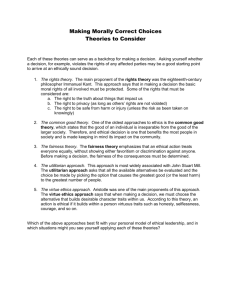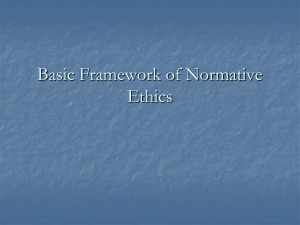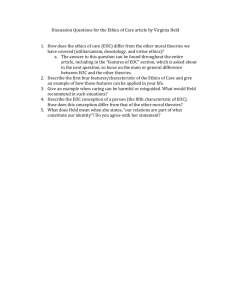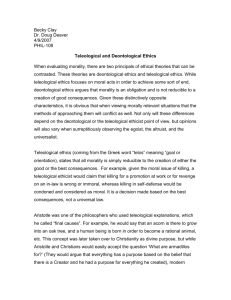(very) Concise Guide to Eight Moral Theories
advertisement
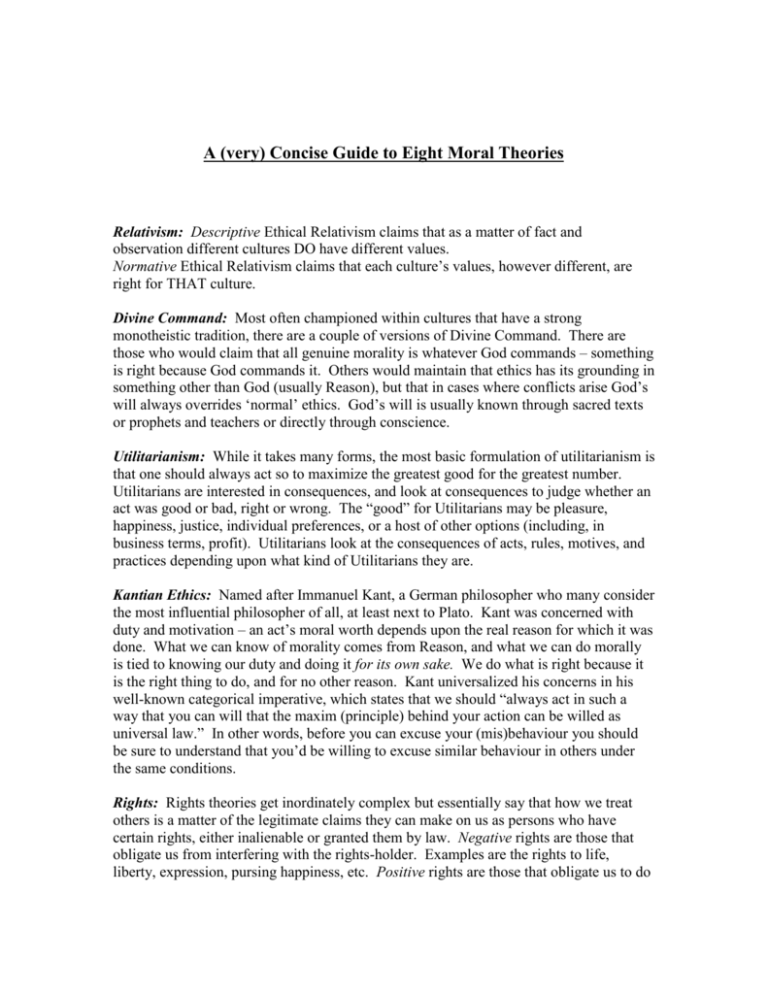
A (very) Concise Guide to Eight Moral Theories Relativism: Descriptive Ethical Relativism claims that as a matter of fact and observation different cultures DO have different values. Normative Ethical Relativism claims that each culture’s values, however different, are right for THAT culture. Divine Command: Most often championed within cultures that have a strong monotheistic tradition, there are a couple of versions of Divine Command. There are those who would claim that all genuine morality is whatever God commands – something is right because God commands it. Others would maintain that ethics has its grounding in something other than God (usually Reason), but that in cases where conflicts arise God’s will always overrides ‘normal’ ethics. God’s will is usually known through sacred texts or prophets and teachers or directly through conscience. Utilitarianism: While it takes many forms, the most basic formulation of utilitarianism is that one should always act so to maximize the greatest good for the greatest number. Utilitarians are interested in consequences, and look at consequences to judge whether an act was good or bad, right or wrong. The “good” for Utilitarians may be pleasure, happiness, justice, individual preferences, or a host of other options (including, in business terms, profit). Utilitarians look at the consequences of acts, rules, motives, and practices depending upon what kind of Utilitarians they are. Kantian Ethics: Named after Immanuel Kant, a German philosopher who many consider the most influential philosopher of all, at least next to Plato. Kant was concerned with duty and motivation – an act’s moral worth depends upon the real reason for which it was done. What we can know of morality comes from Reason, and what we can do morally is tied to knowing our duty and doing it for its own sake. We do what is right because it is the right thing to do, and for no other reason. Kant universalized his concerns in his well-known categorical imperative, which states that we should “always act in such a way that you can will that the maxim (principle) behind your action can be willed as universal law.” In other words, before you can excuse your (mis)behaviour you should be sure to understand that you’d be willing to excuse similar behaviour in others under the same conditions. Rights: Rights theories get inordinately complex but essentially say that how we treat others is a matter of the legitimate claims they can make on us as persons who have certain rights, either inalienable or granted them by law. Negative rights are those that obligate us from interfering with the rights-holder. Examples are the rights to life, liberty, expression, pursing happiness, etc. Positive rights are those that obligate us to do something on behalf of the rights-holder. Examples would be provision of basic food and shelter, education, fair treatment under the law, basic health care, etc. Virtue Ethics: Virtue Ethics is very much back in favor among ethicists and policymakers. It is associated with Aristotle, as well as Catholicism, Buddhism, and other religious traditions. It puts the emphasis not so much on what a person does in any given ethical quandary, but more on the lifelong development of a person’s character, on who that person will be. Virtue Ethics is interested in looking at what the virtuous life consists of, and how best to instill in people those virtues that will allow them to live good lives, lives in which they and their communities thrive. One of the insights of Virtue Ethics is that it does a society or business little benefit to have good laws, rules, and policies in place if there aren’t wise, compassionate, and judicious people around to apply and administer them. Ethics of Care: This notion of ethics has only recently been formalized and categorized, and it comes out of feminist philosophy and literature. The idea here is that ethics, primarily, is and ought to be about caring for others, about understanding and alleviating their pain and suffering. That ethics is finally about the quality of the relationships we have, not about some impartial or universal principles. Social Contract: The view that moral and political beliefs and responsibilities are dependent upon a contract or agreement (implicit as well as explicit) between persons who see that a community or state can only be formed and maintained that way. Teleological theories are those concerned with the ends, goals, purposes or consequences of actions or activities (Utilitarianism is a teleological ethical theory). Deontological theories concern themselves with duty, doing what’s right because it is right (Kantian and Divine Command are deontological theories). In deontological theories what is “right” is prior to or independent of what is “good”; in teleological theories what is “right” is defined as that which maximizes the “good.” In actual practice these differing ways of thinking about what’s right and wrong, good and bad, can and do often overlap; people and institutions tend to be pluralistic in their moral theorizing, whether they are aware of it or not.

